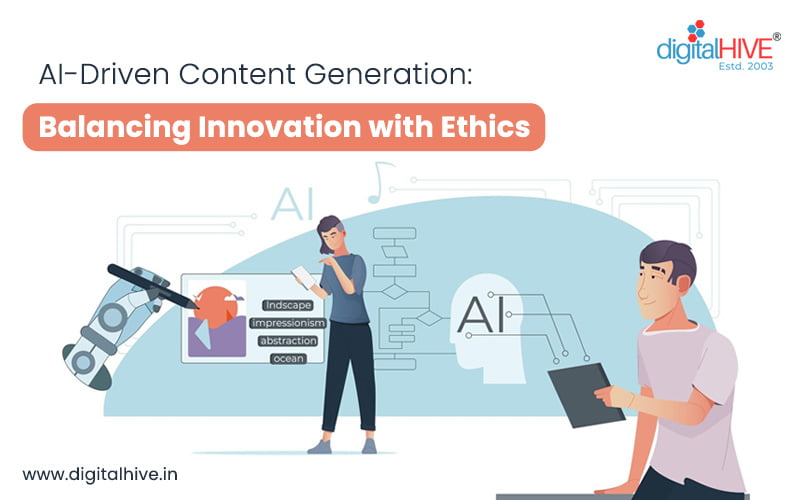Artificial intelligence’s (AI) introduction into the content generation process has revolutionised innovation and communication. This revolutionary technology presents enormous opportunities as well as substantial ethical challenges. Gaining insight into the ways in which AI is transforming the content creation industry can assist both creators and businesses in effectively and ethically navigating this dynamic domain.
Utilising AI to Unlock Creative Potential
Content generation tools powered by artificial intelligence are transforming the ways in which we generate and consume content. Powered by sophisticated algorithms and machine learning, these tools have the capability to produce written text, images, and videos, thereby substantially expediting the creative process and diminishing expenditures. This enables organisations to leverage content production for marketing campaigns, social media, and customer service communications in an efficient manner. It provides creators with unrestricted access to novel opportunities for innovation and exploration, liberating them from the conventional limitations imposed by time and resources.
The rise of AI in content creation, however, is not solely about efficacy. These instruments may also foster innovation by offering creators fresh viewpoints and concepts. AI has the capability to discern latent patterns and trends in extensive datasets, thereby providing novel insights that may stimulate the development of inventive content generation strategies.

Ethical Considerations Regarding Content Generation by AI
Complex and deserving of meticulous deliberation are the ethical ramifications associated with AI-generated content, despite its considerable advantages.
Transparency and Disclosure: Disclosure regarding the use of AI in content creation is one of the most significant ethical concerns. It is the responsibility of consumers to ascertain whether the material they are perusing, observing, or hearing was produced by artificial intelligence. This transparency contributes to the integrity and confidence of digital communications.
The potential for AI tools to generate content on an unprecedented magnitude gives rise to apprehensions regarding the veracity of information. Maintaining the integrity of AI-generated content is of the utmost importance, given that inadequate oversight of these tools could result in the dissemination of false information.
Intellectual Property Rights: The utilisation of pre-existing data by AI to generate content gives rise to concerns regarding copyright and originality. Determining the copyright holder of content generated by artificial intelligence (AI), be it the user, the developer of the AI, or the original data sources, can be a legally intricate process that requires well-defined principles.
The automation of content creation may result in employment displacement within sectors that are highly dependent on human creators, including marketing, journalism, and the arts. It is critical to acknowledge and confront these effects, taking into account the potential for AI to supplement human creativity rather than supplant it.
Fairness and Bias: The impartiality of AI systems is constrained by the quality of the training data. A content generated by Artificial Intelligence that incorporates biases from the training data is likely to perpetuate those biases. Consistent monitoring and revision of AI models are imperative in order to guarantee equity and inclusiveness in content generated by AI.
We need to understand that AI generated content after all is AI’s interpretation of the already available content on the Internet. Already available content may at times be subject to a designed narrative which could be driven by Geopolitical considerations, Religious biases or Commercial Interests of Corporations or any other such social influences. Hence, what AI will generate will always be at the mercy of the authenticity of the information available in the Public Domain! Just for the sake of generating content for Website SEO or a Research publication, do not blindly go on a content generation spree on AI tools, write original pieces from your Case studies, experiences, experiments and more. Use AI based content generation tools to support your original piece as per requirement with a sound understanding of what you are adopting from there.
Charting the Course of AI’s Future in Content Generation
In order to utilise AI tools like Chat GPT or Gemini for content generation in a responsible manner, it is imperative that businesses and creators adhere to ethical guidelines and contemplate the wider ramifications of their actions. This consists of:
Reviewing and updating AI models on a regular basis to guarantee their accuracy and impartiality.
Providing audiences with complete transparency regarding the use of AI in content generation.
Defining explicit legal criteria pertaining to intellectual property and copyright in content generated by artificial intelligence.
Being Empathetic in your use of Artificial Intelligence: When integrating AI into content production processes, considering the social impact, specifically with regard to employment and innovation.
To conclude, AI-powered content generation presents promising prospects for efficiency and innovation within the domains of digital marketing and creativity. Nevertheless, it is critical to strike a balance between these benefits and ethical concerns in order to guarantee that this technology augments the human aspects of creativity and communication rather than diminishes them. By confronting these obstacles directly, we can utilise AI not only to generate content but also to enhance our comprehension and admiration of ingenuity in the era of digitalisation.
